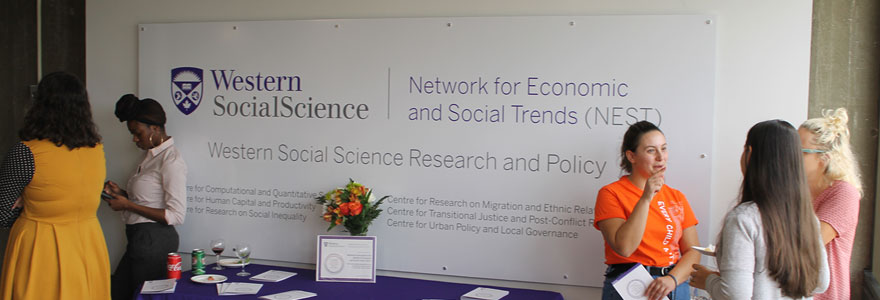News and Updates
Contact
Faculty of Social Science
Social Science Centre
Room 9438
Western University
T. 519-661-2053
F. 519-661-3868
E. social-science@uwo.ca
Recognizing a year of incubating new ideas with NEST
September 24, 2019
Picture and Story by Rob Rombouts
In September 2018, the Network for Economic and Social Trends (NEST) launched as a dynamic opportunity to incubate new ideas in social science research and policy.
In the year since, NEST has hosted a very successful speaker series, issued calls for doctoral and postdoctoral fellows, developed a new Master’s program, and laid the groundwork for exciting cross-disciplinary research.
“Our Faculty has quickly established itself as a national leader in empirical social science. NEST enhances this strength by bringing together people from all of our departments to create synergies that may have otherwise been missed,” said Bob Andersen, Dean of the Faculty of Social Science.
“We’ve laid great groundwork this year and are well positioned to scale things up and develop an exciting array of interdisciplinary policy-relevant research and training,” said Victoria Esses, Director of NEST.
Included in the upcoming research projects is the Canadian Communities Policy Observatory. The observatory will act as a platform for providing information on communities, mapping and matching characteristics of communities to inform and measure the results of policies.
The new NEST Master’s in Research for Policy and Evaluation is a one-year Professional Master’s program. It will emphasize quantitative and qualitative research skills that can be used to develop, evaluate, and enhance policies and programs in a variety of settings, including in government, not-for-profit, and private sectors, preparing graduates for a broad variety of employment opportunities in which strong research skills are desirable.
The NEST speaker series proved to be very popular, with full rooms at each event. The 2018-19 speaker series featured Gary King (Harvard University), Rosemary Nagy (Nipissing University), David Ley (University of British Columbia), David Grusky (Stanford University), and Seth Sanders (Duke University).
The speaker series will continue this year, with plans in place for many exciting presentations.
NEST coffee hours will also return, each Tuesday at 1 pm in the NEST lounge, SSC 6256.
Through the speaker series and the networking coffee hours, the goal is to establish new relationships that will lead to new research. All events are open to everyone in the faculty, in order to encourage collaboration.
“NEST drives many important initiatives, such the Social Science Interdisciplinary Research Grant program, a new post-doctoral and doctoral fellowship program, and a new signature research that reflects our expertise in equality, prosperity and governance,” said Andersen. “In short, NEST plays a very important role in creating a unified research identity for the Faculty of Social Science.”
“We want cross-disciplinary conversations to emerge,” said Esses.
The network’s governing council, made up of academics and community members, was also formed this year. The council will provide strategic advice on research directions, dissemination strategies, educational opportunities, and fundraising.
The doctoral and postdoctoral fellowships, announced in September 2019, are intended to provide graduate student and post-doctoral an opportunity to work on policy relevant issues and policy design, while also bringing in their own ideas and new perspectives on the issues.
All the projects aim to further NEST’s mandate of creating evidence-based research that will inform social and economic policy in Canada and North America. Esses said the work of NEST will always be relevant, and is keenly applicable to issues being discussed during the current federal election campaign.
“All the issues the NEST centres focus on – urban policy, immigration, ethnic relations, human capital and productivity, social inequality, transitional justice – will be discussed leading up to the election, and they will continue to be important,” said Esses.

